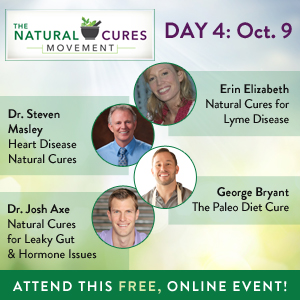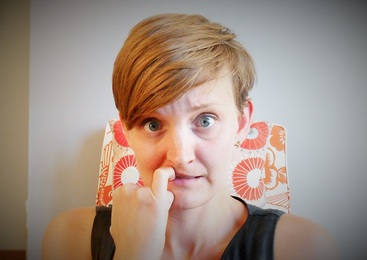|
I am so excited about today's presentations! You and I each know someone or perhaps ourselves who could benefit from the information presented in at least one of these lectures. I'll be watching all four, so you can definitely schedule an appointment with me to see if any of the ideas in these presentations could benefit you. If you decide to watch them today, click here--they're free for 24 hours. If you want to watch them later, click here--you'll get all 30 lectures from the entire summit. Don't forget that if you decide to implement any of the ideas from these lectures, be sure to talk to your doctor first, whether that's me or someone else. Cheers to your health!
0 Comments
Nail biting, skin picking, and hair pulling--onychophagia, excoriation, and trichotillomania, respectively--are all considered obsessive grooming disorders. A recent HuffPost article discusses the negative effects of nail biting as well as ways to eliminate the behavior, but it misses one important treatment option: n-acetylcysteine (NAC). NAC has demonstrated clinical efficacy in all three categories; check out this literature review for more information.
Always talk to your doctor before adding a new supplement to your diet since it may react poorly with your other supplements or medications and because she/he will be able to determine the appropriate dosages for you. You may want to provide your doctor with a copy of the literature review referenced above when you contact her/him to discuss NAC usage, or schedule your complimentary consultation with me today if you are considering utilizing NAC for one or more of these problems. “Gluten-free” has almost become a religion, especially with the increase in awareness about non-celiac gluten sensitivity (NCGS)—a somewhat controversial label since there is no definitive diagnostic test for it. This popularity has led to a lot of confusion and misinformation. So what is gluten, and why is it such a big deal?
Gluten is a group of proteins called gliadin and glutenin. Wheat, barley, rye, and triticale all contain gluten. There are several forms of wheat including:
WHY CAN’T I EAT GLUTEN? Good news: gluten may not be a problem food for you! There are three different disease presentations associated with wheat and gluten. Celiac disease (also known as non-tropical sprue) is an autoimmune disorder in which the affected individual’s body processes the gluten proteins in such a way that the body identifies the molecules as pathogenic, thereby triggering an inappropriate inflammatory immune response. Only about 1% of the population is affected by celiac disease, but up to 80% of people who have it might not be diagnosed with it yet. The clues that may point to celiac disease include the following:
There appears to be a genetic component to celiac disease, but NCGS—the next type of disease presentation—has not demonstrated a genetic component. Little peer-reviewed research (PRR) exists on the topic of NCGS—most articles link back to about 3 PRR articles. However, the body of informal and anecdotal research continues to increase as the popularity of the gluten-free diet grows. Many of the same symptoms of celiac disease may manifest with NCGS, but the symptoms are often less severe. There is frequently a cumulative effect in that an adverse reaction only occurs after long-term, repetitive exposure to gluten. The last disease process is the wheat allergy or sensitivity. Wheat allergy is due to the activation of the IgE response—Type I Immediate Hypersensitivity Reaction—to one or more wheat proteins including albumin, globulin, gliadin, and/or gluten. The following symptoms may occur:
Wheat sensitivity is often due to an IgA or IgG reaction to the fructans in the wheat, which means that it’s necessary to avoid wheat products but not necessarily all gluten-containing products. Some people that feel great after going gluten-free actually just feel better because they aren't exposing themselves to wheat fructans. HOW DO I KNOW IF I HAVE A GLUTEN PROBLEM? Celiac disease is typically verified by a blood test called the tTG-IgA (tissue transglutaminase antibody) test. The lab that I use for this test reports 90% sensitivity (the percentage of celiacs who are correctly identified as having celiac disease) and 95% specificity (the percentage of non-celiacs who are correctly identified as not having celiac disease) for this test. Total IgA Antibody is also performed to screen for IgA deficiency, and if IgA deficiency is present there are two other tests (IgG-tTG antibody or DGP antibody) that can screen for celiac disease. If the blood tests come back positive, an esophagogastroduodenoscopy (EGD) and biopsy will be performed by a gastroenterologist, and genetic tests may be performed. If the blood tests come back negative, but the individual still has symptoms, he or she be checked for other disease processes depending on the presenting symptoms. If those tests come back negative, the two most popular diagnoses of exclusion (meaning the doctor has ruled out everything else) are IBS and NCGS. BUT I DON’T WANT TO SPEND ALL THAT TIME MONEY ON DIAGNOSTIC TESTING! Don’t get me wrong, seeking the advice and diagnostic expertise of a qualified health professional is ideal—especially since some of these disease processes can result in serious health consequences (cancer, for example) the further that they progress. However, you’re not alone in wanting to avoid spending lots of time and money on diagnostic studies since some health insurance plans do not cover all (or any) lab tests, some people do not have health insurance, and almost everyone is busy, busy, busy. This is one reason that I believe the gluten-free diet trend has become so popular. Since you have to buy food and other products anyway, it is merely a matter of making different purchasing decisions, which may take a little extra time at first. SO YOU’VE DECIDED TO GO GLUTEN-FREE In the case of any of the disease processes discussed, total abstinence from gluten or wheat (depending on the process) is the standard treatment. I am still advocating testing, and I definitely recommend talking to your doctor before going gluten-free. If you choose to proceed without any testing, there are a few guidelines that you should follow: DURATION OF TRIAL: Everyone is different in terms of how long it takes to notice positive changes from a gluten-free diet. It can take 6 months to 1 year for your gut to heal and for your symptoms to resolve, although some people may notice immediate changes. Most Complementary and Alternative Medicine (CAM) practitioners recommend a 6-month trial of a totally gluten-free, no-cheating lifestyle.
Do you still have unanswered questions about gluten? Contact me. Are you interested in diagnostic testing? I’m happy to help. Are you gluten-free or have you tried it before? Share your experiences with others. |
Dr. Jaimie L. McCormickDr. McCormick is the chiropractor for OM Chiropractic, which is conveniently located in Kansas City's Crossroads District. Archives
March 2020
Categories
All
|
|





 RSS Feed
RSS Feed
